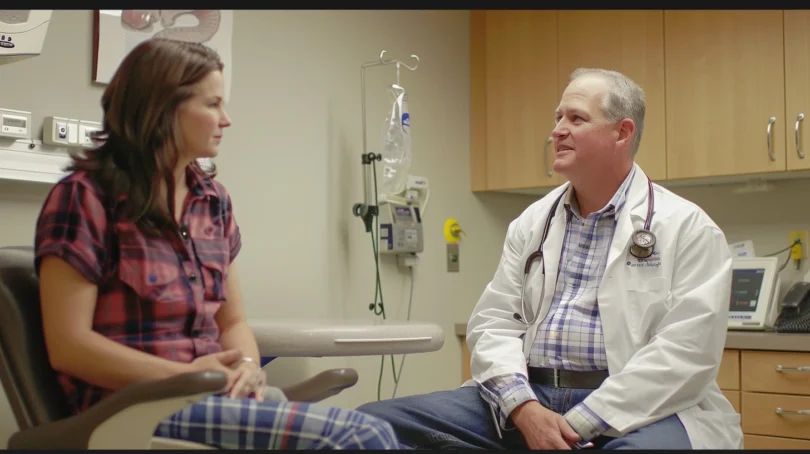However, many people need to pay more attention to regular health checkups; it is like ignoring the importance of proper maintenance in an automobile. We have trained people not to see the doctor if they are well, but that often comes back to bite us. Some checkups can be done to monitor one’s health in a manner that allows early detection of diseases. The aim is for regular testing and not merely treatment without prevention, as this, with time, translates into deplorable health conditions. In this article, we will discuss how crucial it is for people to undergo regular health checkups and the advantages they can derive from such practices, which can save their lives. By taking control of your health through regular checkups, you empower yourself to prevent potential health issues and feel more in charge of your well-being.
Realizing the Necessity of Regular Checkups
Regular health checks play a crucial role in maintaining good overall health. They allow doctors to identify potential health issues before they fully develop. The earlier these issues are diagnosed, the more influential the treatment can be, preventing complications and improving outcomes.
Early Detection of Diseases
One of the most essential advantages of regular checkups is the early detection of diseases. Most chronic medical conditions, such as cancer, heart disease, or diabetes, develop slowly and may not be symptomatic until they have progressed far. They are treatable in the early stages, so checkups are important. Early detection increases the chances of successful treatment and provides a profound sense of reassurance and peace of mind about your health.
Cancer Detection
Cancer remains one of the top causes of death the world over, and catching it early is crucial to ensuring a positive outcome from treatment. Regular mammograms can provide early detection of potentially curable breast cancer, for which time to treatment is an important consideration. Again, colonoscopies can identify and arrest pre-stage three colon cancer that can progress into full-blown disease.
Heart Disease
One of the leading causes is heart disease. Morbidity of heart illness can be prevented if the risk factors that cause these diseases, such as HT, diabetes, and Cholesterol, are promptly controlled. Regular checkups will allow you to detect early signs of the onset of high blood pressure, diabetes, high Cholesterol, etc., which can give rise to a future date with cardiovascular disease. Taking steps to manage these risk factors can help you avoid heart disease later.
Diabetes
Living with diabetes can involve life-long management and, if not well-controlled, complications. However, regularly checking for diabetes will ensure that it is found early and managed properly before its complications can take root, e.g., Heart Attack, Kidney Failure, or Nerve Damage, to name a few.
Preventive Care
Long-term physical checkups also allow you to monitor your health and stay on top of preventive care. Vaccinations, screenings for cancer, and all other aspects of preventive care can help keep the various diseases at bay and ensure good health.
Vaccinations
Vaccines are a significant part of health promotion for foreseeable illnesses. These vaccines prevent some of the nastiest diseases, like flu, pneumonia, and hepatitis. Annual visits ensure you stay current with vaccines and can help keep you and everyone around you safe.
Screenings
Screenings are checkups that look for diseases before they cause symptoms. These may include blood pressure checks, cholesterol tests, and cancer screenings. Screenings allow for early intervention and treatment of potential health concerns.
Lifestyle Counseling
Lifestyle counseling is also a critical component of preventive care. During a checkup, your doctor may discuss your diet, exercise, and lifestyle habits influencing your health. By making healthy lifestyle choices, you can significantly lower your risk of developing many chronic diseases.
Why Preventive Visiting Dentists Regularly?
Regular checkups can provide a wide range of other benefits in addition to early detection and prevention. They can Maintain a High Quality of life, Increase Longevity, and slash Healthcare Costs.
Improved Quality of Life
Regular examinations can improve your quality of life with better care for chronic diseases and earlier intervention. If you have high blood pressure, regular checkups can help keep it under control and prevent heart disease, stroke, or other complications.
Managing Chronic Conditions
Chronic conditions, including asthma, arthritis, and diabetes, require ongoing management. Checkups also enable your doctor to monitor your health and modify your treatment regimen. This can help you control symptoms, improve your quality of life, and prevent complications.
Preventing Complications
Regular screening can help you avoid further complications of old age or a chronic disease. If you have diabetes, diabetic retinopathy can be detected by checking your eyes before your vision is affected. In the same vein, routine foot exams can help to avoid diabetic foot ulcers that put you at risk for amputation with delayed treatment. This proactive approach to your health can help you stay ahead of potential complications.
Increased Lifespan
Regular medical examinations can extend your life by catching and treating illness before it worsens. Research shows that people who go for regular checkups tend to live longer and healthier lives.
Reducing Risk Factors
You can schedule regular appointments to catch and manage specific risk factors that shorten your life. For instance, if you have high blood pressure or hypertension, your doctor can prescribe medication to lower it and suggest specific lifestyle changes. If left uncontrolled, these risk factors can lead to severe conditions such as heart disease and stroke.
Early Intervention
To extend your life, it is essential to participate in an early intervention program. When your doctor examines you regularly, they can find problems before they present irreparable damage. For example, if you have a family history of cancer, active screenings can detect the disease earlier, which could mean earlier detection and, in turn, more effective treatment.
Reduced Healthcare Costs
Preventive Care: Regular checkups can help avoid significant health problems, saving you and the healthcare system a lot of money on serious treatments. By investing in regular checkups, you can secure your financial future by avoiding the high costs of treating advanced diseases.
Avoid Costly Therapies
The monthly fees will also go towards regular checkups, which can help catch medical problems sooner and while they are cheaper to treat. To use an example, it costs a lot less money (and resources) to treat high blood pressure with medication that treats heart attacks or strokes. Foreign: In the same way, treating diabetes with lifestyle changes and medication is less costly than providing care for complications like organ failure or nerve damage.
Preventive Emergency Room Visits
Even well-checks can keep you out of the ER. Whether it is managing chronic conditions or identifying minor health issues prior to escalating into serious problems that require emergency treatment, this can prevent you from feeling the high price of hospital visits and ER stays.
Breaking the Barriers to Routine Dental Checkups
Even though regular checkups are healthy, many people do not go. There are many barriers to them, including price, time, and a fear of the doctor.
Cost
Many people said copay could be the difference between whether someone returns for a follow-up or regular checkups. On the other hand, timely care will help you pay less for significant health issues and require fewer expensive treatments—preventive care: Regular checkups — Most insurance will cover this at no cost.
Affordable Care Act
The ACA mandates that insurance plans cover preventive care, such as visits, free of charge. This is because you are discouraged from going for checkups regularly due to the high price. If you do not have insurance, many community health centers provide low-cost or free checkups.
Lack of Time
One of the most significant barriers to even occasional checkups is time. People may be so busy with life that they don’t have time to see the doctor every year. Nonetheless, regular checkups are crucial for your health and should be a priority.
Making Time for Checkups
An excellent way to build in time for scheduled checkups is one of the items that you would not think twice about adding to your calendar. You might experience the same feelings, but you can say you will be able to get more robust due to checkups — we have talked about work and errands together with this one as a suggestion for checking up on how we are doing.
Fear of Doctors
In addition, doctors’ fear may be a barrier to people getting checkups. They may dread delivering bad news or have experienced failure with doctors previously.
Overcoming Fear
Fear of doctors is difficult to overcome — but it’s worth your health. One thing that will help you get over your fear is finding a doctor you feel comfortable with. Or learn about the benefits of regular checkups and what can happen when things are found early.
Technology for Regular Checkups
Thanks to technology, getting a checkup regularly is easier than ever. Telemedicine and wearable devices can help monitor your health from home.
Telemedicine
It can help you to get medical care from home. You can set up appointments for virtual checkups, speak with a doctor about your symptoms, and get treatment without even leaving your house. Telemedicine can be more accessible in the future as it helps to save time and money.
Benefits of Telemedicine
The telemedicine ratio is time-saving and beneficial in terms of costs and easy access to healthcare. Book Telemedicine Appointments: If you have a busy schedule or live in the middle of nowhere, telemedicine services can be easy to use and make getting your checkups on time much more convenient.
Wearable Devices
Wearable gadgets like Fitbit and smartwatches provide you with updates on your health, meaning they might comb through thousands of never-ending checkups. They monitor your heart rate, how active you are (or aren’t), and even watch over the quality of sleep you’re getting.
Monitoring Health at Home
This will allow you to keep New Year’s resolutions
by tracking your health metrics at home and easily sharing this information with a future appointment or doctor. This can help your doctor predict illnesses early and provide a highly personalized approach.
Is This The Future Of Regular Checkups?
Developments will probably influence regular checkups in the future in technology, humanized healthcare models, and more proactive patients.
Personalized Medicine
Personalized medicine is an approach to health care that provides a tailored treatment recipe for each patient based on their genetic makeup and personalized lifestyle environment. In doing so, the entire process becomes more of a targeted treatment with defined success.
Genetic Testing
Personalized medicine has emerged as a significant concern and an advance in genetic testing. Advise individualized treatment based on genetic predisposition to diseases. If you have a family history of cancer, being screened can help identify the disease earlier before it starts to show symptoms and give a better chance for successful treatment.
Preventive Care
Regular physical exams play a more significant role in preventive care. Routine checkups will become even more critical in maintaining health and preventing diseases.
Health Coaching
Preventive care: A WHITE HOT emerging trend in healthcare right now is health coaching. Health coaches create health plans tailored to meet individuals’ needs, set goals, and modify lifestyles. Regular checkups and a healthy lifestyle can help you stay on the right path.
Conclusion
The only possible solution is to have regular checkups, which can help maintain good health and prevent severe problems. They also help in the early discovery and treatment of illnesses, which may be life-saving. Also, regular checkups will result in enhanced quality of life and increased lifespan, with a subsequent capacity to reduce healthcare costs.
To maintain the above tips, YOU can take a look at our recipes.


Leave a Reply